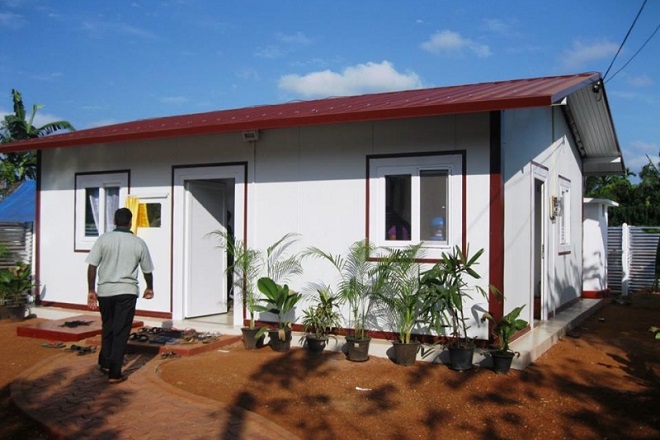By P.K.Balachandran
Tamil National Alliance (TNA) MP for Jaffna District, M.A.Sumanthiran, on Thursday filed a Fundamental Rights petition in the Supreme Court to stop a government project to build 65,000 pre-fabricated steel houses for people displaced by war in the Northern and Eastern Provinces.
The respondents in the case are the Minister for Resettlement and Rehabilitation D.M.Swaminathan, the foreign contractor, Arcelor Mittal Construction France, and the Attorney General.
In his petition, Sumanthiran said that the proposed houses are not suitable from a variety of points of view, and that the award of the tender to Arcelor Mittal Construction France, was flawed.
Even before the tender process was completed, Minister Swaminathan had announced that Arcelor Mittal would be undertaking the construction. This made the tendering process a “mockery” and a “sham”, Sumanthiran said.
buy ivermectin online buy ivermectin online no prescription
He pointed out that experts of the University of Moratuwa had recommended construction of traditional masonry block wall houses as opposed to the above mentioned steel prefabricated houses.
The experts justified their recommendation saying that the proposed prefabricated steel houses would suffer from several key drawbacks including: inadequate foundation; insufficient roof support; risk of steel corrosion; poor ventilation; and poor or non-existent capacity for extension or repair. The houses would also have a much shorter lifespan than traditional block houses.
The experts were worried about the lack of durability of the said prefabricated steel houses; their environmental unsuitability and their relatively high cost. There was also no provision for employing local labor in the implementation of the project.
Sumanthiran pointed out that the pre-fabricated steel houses were going to be built against the wishes of the people and their accredited representatives.
“The District Coordinating Committees of the Jaffna and Kilinochchi Districts of which I am a member also passed unanimous decisions on or around 27th September 2016 rejecting the abovementioned prefabricated steel houses,” he said.
The Cabinet Appointed Negotiating Committee by its report dated September 8, 2016, had recommended that fresh tenders be called on the grounds that houses are a “multi-generational asset” and should be designed from that angle.
“The house design must have the flexibility to be customized according to family needs and must suit the local climatic and social conditions,” the cabinet committee said.
It recommended the use of traditional or pre-fabricated components or a combination of both, but the use of local materials and skills must be encouraged to maximize the benefits accruing to the local economy.
The petitioner said that on November 11, 2016, he tabled in Parliament an alternative proposal by a collective of civil society agencies and persons, for the construction of brick and mortar houses at nearly half the cost ie Rs.1 million per unit, using materials that are environmentally and climatically suitable, and also local labor.
At a Cabinet meeting held on May 9, 2017, it was decided to grant concurrence for the construction of 6000 prefabricated houses. The revised cost of a prefabricated house was put at Rs.1.8 million per house, while previously it was Rs.2.18 million with duties and taxes.
But the petitioner pointed that the Ministry of Housing and Construction and the National Housing Development Authority builds brick and mortar houses for Rs. 500,000 per house. The Ministry of Prison Reforms, Rehabilitation, Resettlement and Hindu Religious Affairs had itself constructed 11,000 houses in 2016 at Rs. 800,000 per house. About 4000 houses are being constructed in 2017 at Rs. 800,000 per house.
“These are being well received by local political authorities and the communities,” the petitioner pointed out.
He suggested the construction of 10,000 to 15,000 traditional brick and mortar houses every year under the owner driven housing concept without further delay. With regard to financing, a committee could be set up to recommend a mechanism to find and disburse funds, he added.
However, by a letter dated June 28, 2017 addressed to the District Secretaries of Jaffna, Kilinochchi, Mullaitivu, Vavuniya, Mannar, Trincomalee, Batticaloa and Ampara the District Secretaries were directed to select beneficiaries for prefabricated houses.
“In the aforesaid circumstances, I state that the following steps must be taken to provide the war-affected community of the North and East with housing: Ascertain the housing preference of the members of the said community (i.e.: whether each beneficiary entitled to a house prefers a brick and mortar house or a prefabricated steel house; Call tenders and then awarded in accordance with the housing preferences expressed by members of the said community; Grant houses to beneficiaries in accordance with their expressed preference.
“I reasonably apprehend that the 1st Respondent (Minister Swaminathan) and/or his servants and /or agents will enter into and/or take steps to enter into a purported contract with the 2nd respondent and/or its servants and/or agents for the said construction of the abovementioned steel prefabricated houses,” the petitioner said.
He pleaded that the failure to call for fresh tenders with regard to the implementation of the housing project is unlawful, unreasonable, arbitrary and illegal and constitutes an infringement and continuing infringement, by Executive and/or Administrative action, of his Fundamental Rights enshrined in Article 12 of the Constitution.
He sought an Interim Order preventing any further steps being taken by the Minister and his agents with regard to the implementation of the construction of the steel prefabricated houses.
Sri Lankan Supreme Court petitioned to stop building steel houses for IDPs

